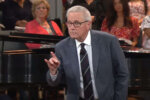Don’t see your limitations as obstacles to God. Think of them as opportunities for Him to accomplish the impossible through you.
As I swerve in and out of traffic on Brooklyn’s busy streets, it’s hard to ignore the bumper stickers pasted onto nearly every car. If I ever put a bumper sticker on my car, it will probably read: “She doesn’t know what she’s doing; she just keeps doing it.” That’s the joke about me that circulates in the Brooklyn Tabernacle, the church my husband, Jim, and I have loved and labored in for the last 29 years.
But despite–or maybe because of–my many inadequacies, I’ve seen God do some amazing things. Sunday after Sunday, as I direct the 275-member Brooklyn Tabernacle Choir, my eyes rest on a sea of faces–brown, black and white–each concealing a remarkable story.
Later, as I sit at the piano, I see men and women throughout the church, faces shining, voices raised, and I am once again grateful to be here. It’s where I belong.
I’ve lived all my life in church. My father, Clair Hutchins, was an opera singer-turned-pastor. I can remember as a 4-year-old, sitting on his knee, listening to a visiting preacher.
I don’t remember what he said, but I’ll never forget what I experienced. God’s presence was so real that it overwhelmed me and left me with a hunger that has shaped my life.
I love the church, but not because it has insulated me from the world. Just the opposite is true; it’s forced me to try things that scared me to death–speaking in public, conducting the choir in front of thousands of people, giving an acceptance speech at the Grammy’s and writing my first book. These are hard assignments for a person like me who has always preferred to stay in the background.
I’m never quite confident I can do what God wants me to do. I’m certain that I can’t unless God does something.
But He’s been faithful, year after year, in every imaginable way. And I want to urge you to consider your own limitations as opportunities for God to show His unlimited power and love.
God’s favor on the Brooklyn Tabernacle and the choir has been incredible; He’s been so good to us. How likely is it that someone who barely made it through high school and who can’t even read a note of music would ever stand on the stage of Radio City Music Hall or Carnegie Hall?
But my story isn’t about fame or the thrill of performance. The Brooklyn Tabernacle Choir doesn’t perform. Our greatest joy is to worship God and lead other Christians to experience Him in worship.
And we want to sing the message of the gospel to those who don’t know Christ. So week after week, we open our hearts to Him, painfully aware that if God doesn’t come to meet us, we will never accomplish our purpose.
We are not naive about the dangers that come with apparent success because we know that self-aggrandizement displeases God. I tell the choir, “God has allowed us to win four Grammys. But there are better choirs out there.
“The only reason He’s blessed us is so He can use us to reach more people. So just remember who you are, and I’ll remember who I am. Apart from God we’re nothing.”
My story is really about what God can do despite–no, because of–our weakness. It’s the story of how He loves us, how He acts in surprising and marvelous ways to do what only He can do.
THE BIG CITY No one is more surprised than I about the way God has worked in my life. My family first came to New York in 1954, when I was only 6 years old.
My dad had accepted an invitation to become pastor of Maranatha Temple, a Scandinavian congregation in Brooklyn. Before that he had served as pastor of a church in Chicago.
A month after we arrived, I sat in Dad’s office, perched on a table, waiting patiently while my mother pulled up my anklets and fastened the buckles on my Sunday-best shoes. All of a sudden, a young boy stuck his head around the corner and stared straight at me. That was my first look at little Jimmy Cymbala, a round-faced boy whose family joined the church shortly after we arrived.
Jim was 11, and he and my brother Richard quickly became best friends. He spent most of his time at our house, treating me as a pesky little sister, nothing more.
Of the six children in my family, I think everyone would agree I was the least likely to grow up and do anything memorable. I was just so shy and insecure. I couldn’t even bring myself to raise my hand in school.
But being in church was totally different. I loved it. Along with my family, I’d spend Wednesday and Friday nights and all day Sunday in church, much of the time kneeling at the altar after each service. Sometimes people would be there for long periods of time waiting on God.
No one was thinking about the time because when you’re in the presence of God there is no time. But my life in church was always overshadowed by the dread of school lying in wait for me on Monday morning.
School was never a safe place for me, a place to be myself and develop my talents. As far as I knew, I didn’t have any talents, anyway, at least not the school kind. I was a daydreamer who loved creative things but hated to study.
Given my deep level of insecurity, you may wonder what has kept me from making my world a safe but narrow place. It’s been my sense of God’s incredible love. I simply wanted to love Him back the best way I could, and I’ve always known that meant saying yes, no matter how awkward or afraid I felt.
I remember as a 17-year-old girl praying, “God, whatever You want with my life, whatever You want me to do, I want to say yes to You.”
In the early years, God asked small things of me, though they felt big enough at the time. As a teenager I played the piano and organ in my father’s church.
Later, when I was 22, Jim and I were pastoring a small church in Newark, New Jersey, where I formed my very first choir. I had invited six middle-aged women to come to my home so I could teach them one simple song we could sing together in church.
But I felt so young and out of place, even though my husband was the pastor. I didn’t eat the whole day and was so nervous I got sick that afternoon before they came and was sick again after the women left–but I survived.
MORE STRETCHING By 1979, Jim and I were at the Brooklyn Tabernacle. I had about 70 choir members, and we decided to make our first recording.
Since I had never been musically trained and didn’t read music, my insecurities rose up again like the world’s biggest mountain. But I played the piano, and the producer brought in other professional musicians to provide the rhythm section and the orchestration.
When Word Music heard our first recording, they wanted the choir to sign a contract with them. That was in 1981. Though Word helped us a great deal, those early years were painful.
I would write songs with a certain feel and rhythm only to have them changed when they were recorded. After completing an album, I would feel depressed. It didn’t sound anything like the way we did the music in church.
But I kept thinking: What do I know? I can’t say anything because I’m not trained. They must know because this is what they do for a living.
Today, I haven’t the slightest problem asserting myself when I feel the music is heading in the wrong direction. Such memories seem comic in light of the other things God has asked me to do since then.
Because of how God has worked in my life, I realize how crucial it is to yield to Him. Our desire to stay in control forces us to pay the highest price imaginable–letting our relationship with God gradually grow cold. Before long, we become mechanical and lose all sense of passion in serving the Lord.
If I’ve done anything worthwhile, it’s been only by the grace of God. He shows Himself strong when I am at my weakest and uses my difficulties to shape me.
WHEN WE ARE WEAK Charles Spurgeon, the great preacher who lived in the 1800s and who battled serious depression, said that the secret of many men and women who have blessed others was found in their response to the tremendous challenges they had to battle. God blessed them and used them not in spite of their difficulties but because of them.
A.B. Simpson, in his book The Holy Spirit (Christian Publications), reflects on the story of Moses in a way that really hits home for me. Moses shrank back from doing what God asked because he felt inadequate (see Ex. 4:10-14).
Simpson points out that Moses’ faith wasn’t large enough to match the promise God had made to him. So he shared his commission with his brother, Aaron, and his brother actually made things more difficult for him.
If you really want God to use you, then you have to be willing to follow Him into uncomfortable places and to do things you simply can’t do on a natural level. The life that Jesus offers is a supernatural life, and it makes no sense at all to the natural mind.
God chooses the foolish to display His wisdom. He chooses the weak to display His strength (see 1 Cor. 1:26-29).
My story involves doing the very things I dread. Not that I hated the thought of using my musical gifts or leading a choir. I had dreamt about leading a large choir since I was a child. But I never wanted the attention that comes with it.
I never wanted to get up on a stage and speak. But I’ve done it anyway. I’ve learned that doing God’s will hasn’t always been easy, but it has always been good.
It has always been better than I imagined and has taken me beyond my small plans to God’s big plans. Because of His promise and proven faithfulness, I know that nothing is impossible for God.
Carol Cymbala is the director of the Brooklyn Tabernacle Choir and author of He’s Been Faithful (Zondervan).






Leave a Comment
You must be logged in to post a comment.